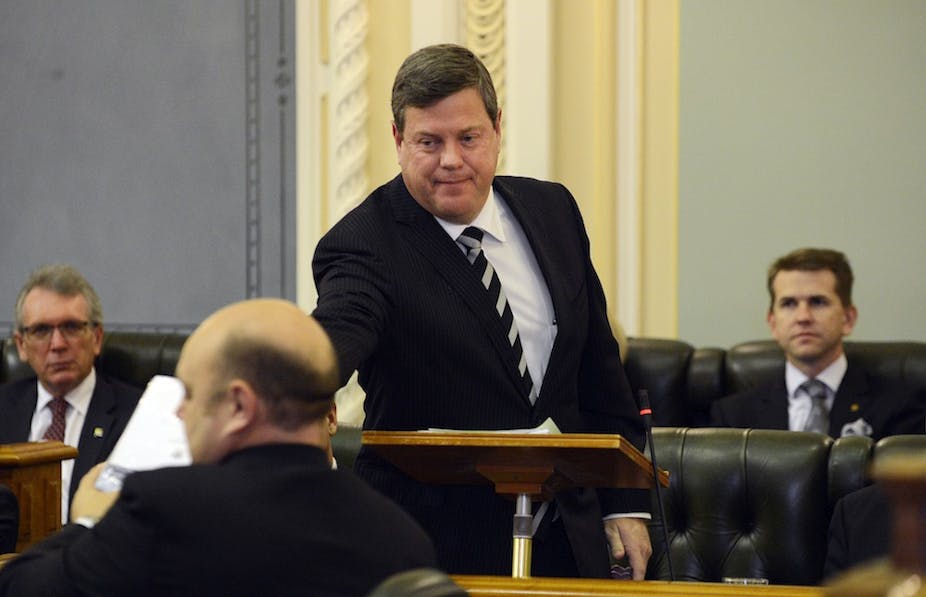Queensland Treasurer Tim Nicholls’ second budget has the usual collection of initiatives and some very good ones at that. Increased spending on education, disability services and health will nearly always be welcome, of course, but the regional focus is especially noteworthy. On the downside, cost of living is something that looms large for most people and some items in this budget will be viewed as contributing to these costs rather than alleviating them.
All of this makes for interesting discussion; but in this political environment, the bottom line - deficit or surplus - was always going to be the main public focus. The Treasurer and his colleagues have done little to discourage this: a substantial part of the Newman government’s political message has been around the previous Labor government’s profligacy. However, sooner or later, a lingering deficit becomes the current government’s political burden. The tables turn.
“Balance” figures prominently in the Treasurer’s budget speech. Indeed, he quotes himself from 2012: “Maintaining that balance, in the absence of extraordinary events, will complete the first stage in repairing Queensland’s finances.” Balance usually means only one thing: a balanced budget. At least, if a surplus cannot be achieved then we should at least aim for a modest deficit.
The deficit, however, is quite a bit less modest than expected, coming in at $7.7 billion against a forecast of $4.6 billion, with $2.2 billion in revenue written down since 2012-13 budget due to a fall in coal exports, falling state taxes including land tax and the cost of the state’s “summer of natural disasters”. The budget is also expected to remain in deficit next year. It is only in 2015-16 by Treasury’s estimates that it will return a $1 billion surplus.
None of this is certain, of course, and Queensland’s natural environment has already presented numerous challenges - such as the devastating 2011 floods - to the State’s financial overseers. Among other things, this is why the preoccupation with surpluses and deficits is so strange and potentially harmful.
Events like the 2011 floods and the second wave of natural disasters do happen from time to time. When they happen, the money must be spent to fix the damage and if the government doesn’t have the money at the time it has to be borrowed.
We should shift our focus away from the preoccupation over whether surpluses are “good” and deficits are “bad” and focus instead on what taxpayer money is being spent on.
Deficits that emerge because a government is forced to rebuild communities and infrastructure in the aftermath of a natural disaster are not “bad”. A surplus that emerges when booming revenues more than make up for government profligacy is not “good”.
If we focus too much on the surplus or deficit, we fail to consider these important things. Most people see nothing wrong with borrowing to invest in productive assets. Investing in new assets or repairing existing ones is an activity that can have substantial longer term advantages. It is the case, however, that debt and the interest payments that attend it must be carefully managed.
The government’s approach is to reduce the borrowing commitment over the next two years and save interest in the process. The Treasurer says the government will save $750 million in interest by reducing the borrowing requirement by $6 billion. This is money, the Treasurer says, that can be spent on services. All well and good, as long as it is not wasted.
The problem it seems is that any and all budget deficits imply waste while directing money to services is accepted as sound policy. But governments that run a deficit because they are investing in productive assets, as long as they have the rest of their house in order and as long as the appropriate amount of prudence has been applied, should not be criticised for doing so.
Governments should not, through fear of criticism of their fiscal position, fail to invest in productive assets that have a future return that more than makes up for their current cost. Conversely, governments that run surpluses should not escape a critical review of their spending initiatives.
The good thing, one would think, about a government focused on “repairing the state’s finances” is that it may focus more than usual on each penny it intends to spend and identify with more than usual diligence those pennies that it might save. The avoidance of waste is a habit that no-one would be displeased to see displayed by those holding the state’s purse strings.
Every budget contains expenditures that will fit into the “waste” category from someone’s point of view; but leaving these sorts of value judgements aside, the casting of a critical eye over the latest detailed account of the state’s finances should be scanning for waste, not the size of the surplus or deficit.

